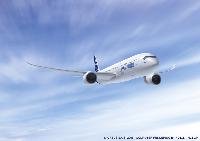Afriqiyah Airways has signed a firm contract with Airbus for the purchase of six A350-800s for its long-term expansion plan. This comes in addition to the 14 A320 Family aircraft and three A330-200s this young and dynamic airline from Libya already has on order.
With deliveries to Afriqiyah commencing in 2017, the A350 XWBs will allow Afriqiyah Airways to expand its long-haul operations in the longer term.
„This order for the A350 XWB will allow us to prepare our ambitious but realistic expansion plan,“ Captain Sabri, CEO of Afriqiyah Airways, said. „It will allow us to capitalise on the recent decision by the Libyan Authorities to establish Tripoli as a major hub in Africa by building a totally new modern terminal of 20 million passenger capacity and upgrading Libya’s airport facilities. The aircraft and the timing of delivery is right for us.“
„With this contract, the first from an African carrier for the A350 XWB, Afriqiyah Airways is a trend setter on the African continent. The aircraft will allow Afriqiyah Airways to be very cost efficient while offering the best cabin in this category, which perfectly fits the needs and ambitions of the airline. We greatly value this new order and will be alongside of Afriqiyah Airways to support their development plan over the years to come,“ Fabrice Bregier, Chief Operating Officer of Airbus, said.
The A350 XWB (Xtra Wide-Body) Family is Airbus‘ response to widespread market demand for a series of highly efficient medium-capacity long-range wide-body aircraft. With a range of up to 8,300 nm / 15,400 km, it is available in three basic passenger versions: the A350-800 accommodating 270 passengers, the A350-900 seating 314, and the A350-1000 for 350 passengers. The A350 has the widest fuselage in its category, offering unprecedented levels of comfort, the lowest operating costs and lowest seat mile cost of any aircraft in this market segment. Powered by two new generation Rolls Royce Trent XWB engines delivering each up to 92,000 lbs of thrust, the A350 XWB Family is designed to confront the challenges of high fuel prices, rising passenger expectations, and environmental concerns.
Photo: Airbus S.A.S. 2006 ©






